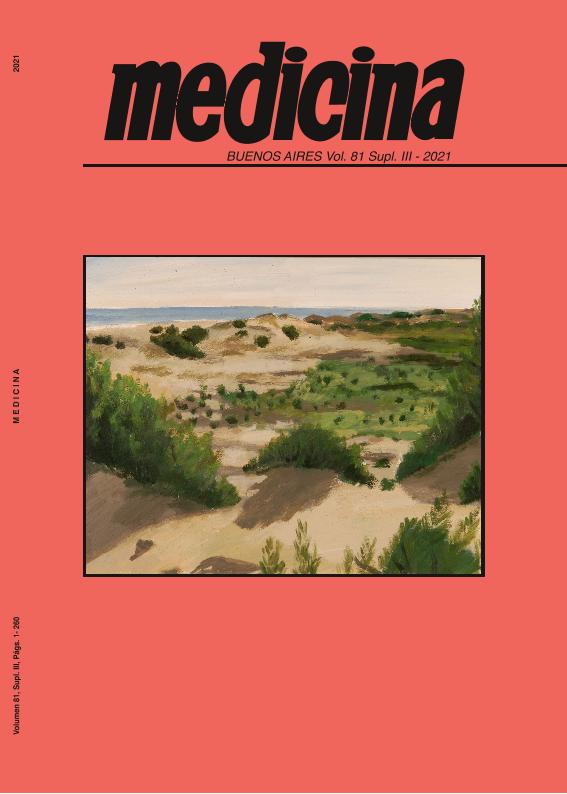Evento
Antiandrogens pose a protective effect against COVID-19 by boosting the human myxovirus resistance gene 1 (mx1)
Bizzotto, Juan Antonio ; Sanchis, Pablo Antonio
; Sanchis, Pablo Antonio ; Lavignolle, Rosario; Lage Vickers, Sofia
; Lavignolle, Rosario; Lage Vickers, Sofia ; Sabater, Agustina Ayelen; Abbate, Mercedes; Toro, Ayelen Rayen
; Sabater, Agustina Ayelen; Abbate, Mercedes; Toro, Ayelen Rayen ; Anselmino, Nicolás
; Anselmino, Nicolás ; Labanca, Estefania; Navone, Nora; Vazquez, Elba Susana
; Labanca, Estefania; Navone, Nora; Vazquez, Elba Susana ; Cotignola, Javier Hernan
; Cotignola, Javier Hernan ; Gueron, Geraldine
; Gueron, Geraldine
 ; Sanchis, Pablo Antonio
; Sanchis, Pablo Antonio ; Lavignolle, Rosario; Lage Vickers, Sofia
; Lavignolle, Rosario; Lage Vickers, Sofia ; Sabater, Agustina Ayelen; Abbate, Mercedes; Toro, Ayelen Rayen
; Sabater, Agustina Ayelen; Abbate, Mercedes; Toro, Ayelen Rayen ; Anselmino, Nicolás
; Anselmino, Nicolás ; Labanca, Estefania; Navone, Nora; Vazquez, Elba Susana
; Labanca, Estefania; Navone, Nora; Vazquez, Elba Susana ; Cotignola, Javier Hernan
; Cotignola, Javier Hernan ; Gueron, Geraldine
; Gueron, Geraldine
Tipo del evento:
Reunión
Nombre del evento:
LXVI Reunión anual de la Sociedad Argentina de Investigación Clínica; LXIX Reunión Anual de la Sociedad Argentina de Inmunología; LIII Reunión Anual de la Asociación Argentina de Farmacología Experimental y XI Reunión Anual de la Asociación Argentina de Nanomedicinas
Fecha del evento:
17/11/2021
Institución Organizadora:
Sociedad Argentina de Investigación Clínica;
Sociedad Argentina de Inmunología;
Asociación Argentina de Farmacología Experimental;
Asociación Argentina de Nanomedicinas;
Título de la revista:
Medicina
Editorial:
Fundación Revista Medicina
ISSN:
1669-9106
Idioma:
Inglés
Clasificación temática:
Resumen
Population-based studies have shown that prostate cancer (PCa) patients undergoing androgen-deprivation therapies (ADT) were partially protected from COVID-19. Men treated with proxalutamide in a recent clinical trial showed reduced COVID-19 hospitalization rate. In this work we assessed gene expression profiles and androgen regulation of the main host cell receptors described for SARS-CoV-2 and potential antiviral genes involved in response to coronavirus infection.Multiple bioinformatics analyses were performed to study host cell receptors and antiviral proteins in SARS-CoV-2 infection and the gene expression changes upon ADT was assessed. We used publicly available datasets from: a) SARS-CoV-2 positive and negative patients? nasopharyngeal swabs at time of diagnosis (GSE152075, n=453), b) SARS-CoV-2 infected human cell lines and ferrets (GSE1407507), c) ChIP-seq experiments evaluating androgen receptor binding (GSE66037, GSE28950, GSE108704).Results showed that SARS-CoV-2 positive cases had higher MX1 expression, and multivariable regression showed that MX1 expression significantly increased with viral load. Also, MX1 was significantly up-regulated in tracheal samples from ferrets intranasally infected with SARS-CoV-2. Similar results were found in A549 and Calu3 lung cell lines. Since ADT might result in a therapeutic advantage against COVID-19, we next evaluated MX1 regulation by dihydrotestosterone (DHT). First, comparable MX1 levels in lung, prostate and salivary gland of healthy humans were observed (GTEx). LNCaP cells treated with DHT showed a decrease (p<0.05) in MX1 mRNA levels. ChIP-seq experiments showcased AR binding sites on the MX1 sequence upon DHT. Further, comparison of paired PCa patient?s samples before and after ADT showed MX1 upregulation (p<0.05) after ADT.In summary, MX1 raises as a critical responder in SARS-CoV-2 infection and we demonstrate MX1 modulation by DHT. We propose MX1 as a key player in the therapeutic advantage posed by ADT.
Palabras clave:
antiandrogens
,
COVID-19
,
mx1
Archivos asociados
Licencia
Identificadores
Colecciones
Eventos(IQUIBICEN)
Eventos de INSTITUTO DE QUIMICA BIOLOGICA DE LA FACULTAD DE CS. EXACTAS Y NATURALES
Eventos de INSTITUTO DE QUIMICA BIOLOGICA DE LA FACULTAD DE CS. EXACTAS Y NATURALES
Citación
Antiandrogens pose a protective effect against COVID-19 by boosting the human myxovirus resistance gene 1 (mx1); LXVI Reunión anual de la Sociedad Argentina de Investigación Clínica; LXIX Reunión Anual de la Sociedad Argentina de Inmunología; LIII Reunión Anual de la Asociación Argentina de Farmacología Experimental y XI Reunión Anual de la Asociación Argentina de Nanomedicinas; Argentina; 2021; 76-77
Compartir



